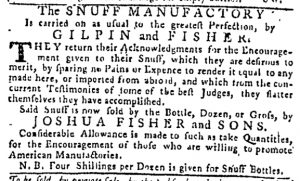What was advertised in a colonial American newspaper 250 years ago today?

“For the Encouragement of those who are willing to promote American Manufactories.”
While the Townshend Acts remained in effect, imposing duties on paper, glass, lead, paint, and tea imported in the American colonies, the number and frequency of newspaper advertisements promoting “American manufactories” increased. The partnership of Gilpin and Fisher joined the chorus of advertisers encouraging colonists to “Buy American” in the late 1760s. In an advertisement for their “SNUFF MANUFACTORY” in the October 5, 1769, edition of the Pennsylvania Gazette, Gilpin and Fisher extolled the quality of their product. They proclaimed that they “spar[ed] no Pains or Expence to render” their snuff “equal to any made here” or, more significantly, “imported from abroad. That was not merely their own puffery but rather the assessment of “some of the best Judges,” though Gilpin and Fisher did not publish their “concurrent Testimonies” nor name those “Judges.” Still, they made their point: consumers did not have to sacrifice quality when purchasing from Gilpin and Fisher’s “SNUFF MANUFACTORY” instead of buying imported alternatives.
Elsewhere in the advertisement, they incorporated another popular element of the “Buy American” motif that emerged in response to an imbalance of trade with Britain, the Townshend Acts, and nonimportation agreements adopted in cities and towns in several colonies. According to many editorials and advertisements, American consumers had a moral imperative to purchase goods produced in the colonies. Doing so would correct the trade imbalance while simultaneously exerting economic resistance to Parliament’s attempts to tax the colonies via import duties. Joshua Fisher and Sons sold the snuff “by the Bottle, Dozen, or Gross,” offering discounts to those who bought in bulk. To convince both consumers and retailers to take advantage of such deals, the tobacconists called on those “willing to promote American manufactories.” The two appeals buttressed each other: purchasing “domestic manufactures” was good politics but also savvy business when getting a bargain for doing so. The “Considerable Allowance” promised to those who purchased by volume likely made products from Gilpin and Fisher’s “SNUFF MANUFACTORY” even more enticing for prospective customers who wanted to practice politics through their decisions in the marketplace.
The imperial crisis and American reactions to it did not unfold solely in the news items and editorials in colonial newspapers. Instead, merchants, shopkeepers, artisans, and others addressed the political issues of the day in their advertisements. The appeals they made to consumers helped to shape American resistance to Parliament’s attempts to raise revenues and regulate commerce in the colonies.
